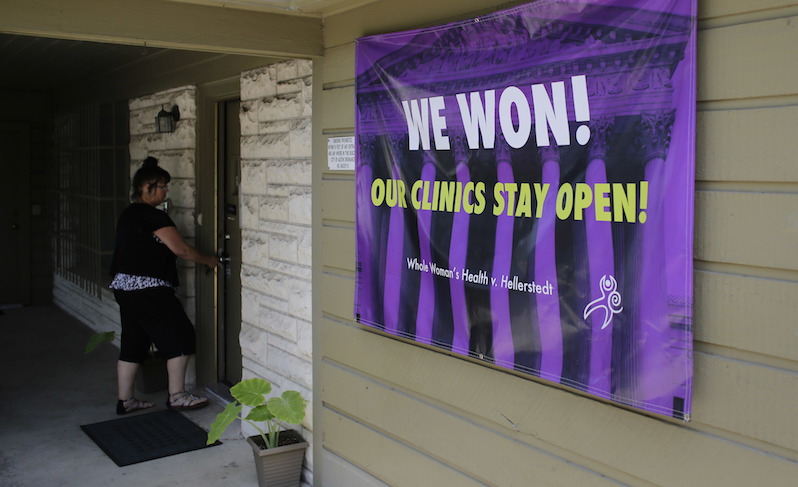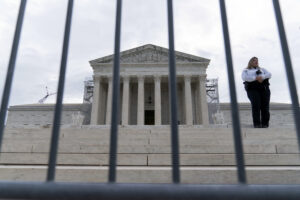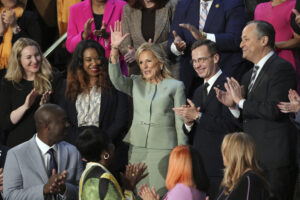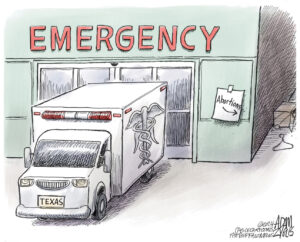Abortion Rights Find Strong Champions Among the Clergy
The news media are not presenting a complete picture For generations, many ministers have stood with people making difficult choices about their reproductive lives The news media are not presenting a complete picture. A woman enters Choice Clinic, formerly Whole Woman's Health Clinic, in Austin, Texas, following a recent Supreme Court ruling supporting reproductive rights. (Eric Gay / AP)
A woman enters Choice Clinic, formerly Whole Woman's Health Clinic, in Austin, Texas, following a recent Supreme Court ruling supporting reproductive rights. (Eric Gay / AP)
A woman enters Choice Clinic, formerly Whole Woman’s Health Clinic, in Austin, Texas, following a recent Supreme Court ruling supporting reproductive rights. (Eric Gay / AP)
The abortion debate in the U.S. has always been situated at the intersection of health, law and faith. Last week, the Supreme Court made a historic call that signals a legislative shift—one with which religious leaders who support reproductive justice strongly agree.
The June 27 decision by the Supreme Court to overturn key provisions of Texas House Bill 2 in the Whole Woman’s Health v. Hellerstedt case establishes unequivocally that abortion is a legal medical procedure that cannot be restricted by the “undue burden” of frivolous regulations whose primary effect is to prevent or impede a woman’s access to abortion care. Hailed as the most important ruling on abortion by the Supreme Court in nearly a quarter century, the court’s 5-3 majority decision firmly defended previous rulings (most notably Planned Parenthood v. Casey from 1992 and ultimately Roe v. Wade from 1973) and put other state legislatures on notice.
Currently, many mainline denominations espouse a pro-choice position on abortion. But based on coverage in the mainstream media, one would think all religious organizations oppose legal abortion. That is definitely not the case, as will be clarified below—but first, a little background about this latest SCOTUS decision and the interests and parties involved.
Across the nation, legislators and their right-wing religious allies have promulgated Targeted Regulations of Abortion Providers (TRAP) laws. Proponents of TRAP laws are not primarily concerned with the health of women who are seeking to terminate a pregnancy; instead, their true objective is to prevent women from exercising a right that TRAP supporters believe they should not have. And while even the staunchest anti-choice advocate understands that the Supreme Court (particularly with its current composition) is not going to overturn Roe v. Wade, pro-TRAP strategists thought they could work to limit women’s access to abortion under the guise of raising the standards for clinics that provide abortion care and imposing the requirement that abortion doctors obtain hospital admitting privileges.
These standards, the Supreme Court ultimately determined, added no measurable improvement to women’s health because there was no record of negative outcomes from the clinics targeted for regulation. The court determined that the regulations were offering to fix a problem that didn’t exist since abortion is one of the safest procedures of its class that a woman can undergo—far safer, Justice Ruth Bader Ginsburg noted, than delivering a baby, which can legally be done at home.
The current regime of right-wing religious forces has advanced the argument that the health of women is imperiled by abortion clinics and by the abortion procedure itself. Their remedy is to push legislation that imposes standards that would rack up millions of dollars in compliance costs yet not improve care in any significant way. In fact, the Supreme Court majority argued that the true impact of the TRAP laws would be significantly detrimental to women’s health.
By closing clinics unable to afford the unnecessary expenses, the laws have forced women in certain parts of Texas to travel hundreds of miles for abortion care. Travel time, travel costs and overnight stays all combined to create significant delay for a woman seeking abortion care. Such delays have pushed many first-trimester abortions into second-term procedures. So, the real results of these TRAP laws increased the risks to women’s health. The cynicism of those who claim to care about women’s lives and health cannot be overstated.
The religious dimension provides important context for the abortion debate. One aspect that is not receiving sufficient media attention in the current environment is the historic advocacy of religious leaders who supported legalization of abortion. In 1967, the Clergy Consultation Service, founded by the Rev. Howard Moody of Judson Memorial Church in New York City, organized clergy to counsel, accompany and procure safe (but as yet still illegal) abortions for women. Currently, the work that the Clergy Consultation Service began is being carried out by the Religious Coalition for Reproductive Choice (RCRC) in Washington, D.C. Clergy members from all across the nation are continuing to offer counsel, support and resources for women seeking abortion care. They are motivated by their faith and their deep religious conviction that they must advocate for safe, legal abortion for any woman who seeks it. Their moral and religious reasoning is rooted in their deep call to justice and equality.
Reproductive justice requires that every member of society have the personal freedom to live her or his reproductive life as she or he may determine without interference by persons, churches or governments. It is a clear injustice for anti-choice forces to violate the personal freedom and bodily integrity of a woman through TRAP laws. Interfering with a woman’s reproductive life as she has defined it through her faith in God, or interfering with a woman’s health care as prescribed by her doctor, is sin in the eyes of these advocates among the clergy.
Pro-choice clergy members believe that women have the moral agency to make their own decisions, in the light of their own faith, to determine whether, when and how many children to bear. Reproductive justice requires that the resources to define and conduct their reproductive lives should be available to all women without interference, shaming protests or TRAP laws standing in their way.
The Rev. Madison Shockley is a member of the board of directors of the Religious Coalition for Reproductive Choice and pastor of the Pilgrim United Church of Christ in Carlsbad, Calif.
Make sure to show your support for Truthdig’s independent journalism by visiting our donation page.
Rev. Shockley: Support Bringing Truth to a Post-Truth Era from Truthdig on Vimeo.
Your support matters…Independent journalism is under threat and overshadowed by heavily funded mainstream media.
You can help level the playing field. Become a member.
Your tax-deductible contribution keeps us digging beneath the headlines to give you thought-provoking, investigative reporting and analysis that unearths what's really happening- without compromise.
Give today to support our courageous, independent journalists.






You need to be a supporter to comment.
There are currently no responses to this article.
Be the first to respond.